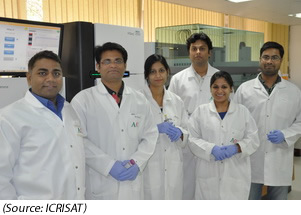
Researchers Crack Genome that May Lead to Development of Allergen-free Peanuts
June 8, 2016| |
 A team of international researchers, including scientists from the International Crops Research Institute for the Semi-Arid Tropics (ICRISAT) decoded the genome of the ancestor of peanut, the diploid A-genome (Arachis duranensis). This breakthrough opens the doors towards developing allergen-free, aflatoxin-free, and nutrition-rich varieties.
A team of international researchers, including scientists from the International Crops Research Institute for the Semi-Arid Tropics (ICRISAT) decoded the genome of the ancestor of peanut, the diploid A-genome (Arachis duranensis). This breakthrough opens the doors towards developing allergen-free, aflatoxin-free, and nutrition-rich varieties.
The findings, published in Proceedings of the National Academy of Sciences (PNAS), include the draft genome of the groundnut A-genome progenitor containing 50,324 protein-coding gene models. Analysis of the complete DNA sequencing suggests that the peanut lineage was affected by at least three sets of chromosomes since the origin of flowering plants. The findings also provide millions of structural variations that can be used as genetic markers for the development of peanut varieties with improved traits such as increased pod and oil yield, drought and heat tolerance and greater disease resistance through genomics-assisted breeding.
"This study has not just provided the full genome sequence to help plant breeders across the globe to develop more productive and more resilient groundnut varieties in a faster manner, but also provides us an insight to geocarpy, a reproductive process where the flowers grown on the stem go inside the soil and pod formations occur," said Dr. Rajeev Varshney, Co-Coordinator of Genome Sequencing Project and Research Program Director, Genetic Gains program at ICRISAT.
Read the news article from ICRISAT. Read the research article in PNAS.
| |
Biotech Updates is a weekly newsletter of ISAAA, a not-for-profit organization. It is distributed for free to over 22,000 subscribers worldwide to inform them about the key developments in biosciences, especially in biotechnology. Your support will help us in our mission to feed the world with knowledge. You can help by donating as little as $10.
-
See more articles:
-
News from Around the World
- Researchers Crack Genome that May Lead to Development of Allergen-free Peanuts
- Oxford University Scientists Discover Oldest Root Meristem
- Biologist Finds Way for New Approaches to Fight Plant Disease
- CropLife Reports 20 Years of GM Crop Benefits in Australia
- Plants Remember Previous Stress to Help Protect Themselves
- Silenced Susceptibility Genes in Potato Result in Late Blight Resistance
- Scientists Discover Protein which Boosts Rice Yield by 50 Percent
-
Research Highlights
- Scientists Modify Bt Toxin to Improve Activation in Pea Aphid Gut
- Rol Genes Enhance Production of Antioxidants in Artemisia carvifolia
- NtTTG2 Gene Regulates Tobacco Growth and Seed Production via AUXIN RESPONSIVE FACTOR Genes
-
Beyond Crop Biotech
- Genomes of Wild Parents Reveal Complex History of Garden Petunias
- Chemists and Biologists Make Bionic Leaf That Produces Alcohol Fuel
- University at Buffalo Researchers Develop Vaccine that Strikes Only When Needed
-
Announcements
- CAFEi2016
-
Resources
- Feeding the World in Future: Where Does GM Fit in?
-
Read the latest: - Biotech Updates (February 18, 2026)
- Gene Editing Supplement (January 28, 2026)
- Gene Drive Supplement (February 22, 2023)
-
Subscribe to BU: - Share
- Tweet
